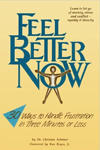Note: This web site provides information about several of my books, my blogs, and other writings. Each book-page includes most of the first chapter or the Introduction. For more information click the About tab, above.
I’ve just revised the About page, so here’s the new version.
About this Web Site
This site provides information about several of my books, my blogs, and other writings. It includes pages about four books:
Your Living Mind: The Mystery of Consciousness and Why It Matters to You
Bridging the God Gap: Finding Common Ground Among Believers, Atheists and Agnostics
Feel Better Now: 30 Ways to Handle Frustration in 3 Minutes or Less
Do Think Twice: Provocative Reflections on Age-Old Questions.
Each of these four book-pages includes most of the first chapter or the Introduction. I’ve also created pages describing my blogs, with sample posts from each.
I have always been fascinated by the Big Issues that puzzle everyone from school-age children to eminent scholars – how we can tell right from wrong, how we can know anything at all, the search for core values, moral rules vs. moral relativism, free will vs. determinism, theism vs. atheism, the mystery of consciousness, puzzles about selfhood, and how to deal with death. These are not just academic issues. They have a subtle but profound impact on the quality of our lives.
I am incredibly fortunate to have had the opportunity to consider these questions in depth for several decades. Being an early reader gave me a head start, so that by the time I entered college I was ready to jump into the deep end. I majored in philosophy, religion, and psychology, and went on to earn a doctorate in religion from Claremont School of Theology, a respected seminary in southern California. I became a psychotherapist and a Unitarian Universalist minister. I’ve taken several sabbaticals for further study, and since 2008 I’ve been writing, speaking, and leading workshops about my books, full-time.
After grappling with the Big Questions, do I have any Big Answers? I am far too emotionally involved with my work to be objective about that. But I have been willing to bet my life that if enough of us dive deeply into exploring these perennial enigmas, we will find new insights that move us closer to the truth – insights that help us become both more rational and more humane. I’m doing what I can. It’s up to others to decide whether I’ve had any success.
I would love to know how you respond to what I’ve written.
Roger Christan Schriner
Educational and professional background:
Dr. Roger “Chris” Schriner is a writer, psychotherapist, and Unitarian Universalist minister. He earned a B.A. from the University of Redlands summa cum laude in religion, philosophy, and psychology, a Doctorate in Religion from Claremont School of Theology, and an M.S. in Family Counseling from the University of LaVerne. His Honors Thesis at Redlands examined the ethical thought of theologian Paul Tillich and his dissertation at Claremont School of Theology dealt with nuclear weapons policy. He worked for 25 years as a psychotherapist and he is Minister Emeritus of Mission Peak Unitarian Universalist Congregation in Fremont.
He is the author of six books, the most recent of which are:
Bridging the God Gap: Finding Common Ground Among Believers, Atheists and Agnostics, http://www.amazon.com/Bridging-God-Gap-Believers-Agnostics/dp/0984584005/ref=sr_1_1?s=books&ie=UTF8&qid=1312308771&sr=1-1
Your Living Mind: The Mystery of Consciousness and Why It Matters to You,
Blogs:
The Mystery of Consciousness, and Why It Matters
http://mysteryofconsciousness.wordpress.com
Did God Really Say THAT!? A Blog about the Bible
http://didgodreallysaythat.wordpress.com.
Theists & Atheists: Communication & Common Ground
http://theistsandatheists.wordpress.com




